Is your kombucha too vinegary and sour? Or does it ferment more quickly than it’s supposed to? Here’s how to prevent and fix over-fermented kombucha!

This is a question I’ve seen popping up more and more in our Kickass Kombucha Brewers Facebook Group, so today we’re deep diving into the what’s, why’s, and how-to-fix-it’s of vinegary kombucha!
Why kombucha becomes vinegary
In order to troubleshoot over-vinegary kombucha, it’s important to understand why kombucha becomes sour in the first place.
When kombucha ferments for longer, it becomes more acidic. This is because the yeast in the SCOBY eat the sugars and tannins in your kombucha, transforming them into ethanol. The bacteria feed on this ethanol, turning it into acidity and giving kombucha its distinctively tart taste. Finished kombucha usually has a pH between 2.5 and 3.5 (the lower the pH, the more sour it is).
But sometimes the process becomes off balanced or goes to far, and when that happens you get extremely tart, vinegar-tasting kombucha. While tart kombucha is not unsafe (it’s actually filled with even more probiotics), the taste can be too intense for some people.
“I have had this acid problem every time I Brew. Scobies seem to generate at a great rate and I can never seem to get a clean brew. It’s always cloudy or has a great deal of sediment. Help!”
The cloudiness (and sour taste) are from over active yeast. Try removing the…
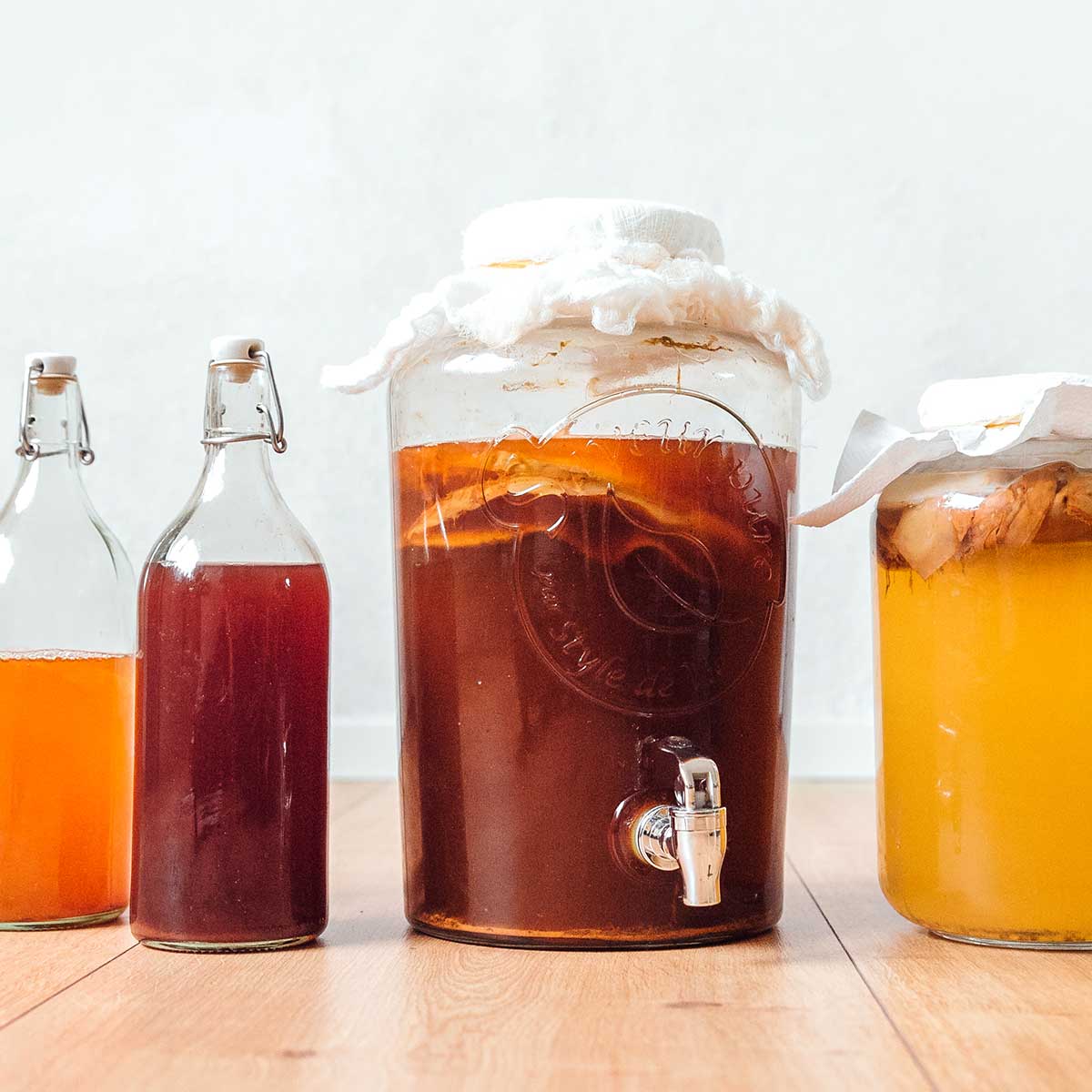
How to prevent vinegary kombucha
Brewing kombucha is all about the taste balance between sweet and tart. Here are a few ways to prevent your kombucha from becoming too sour:
Don’t let it ferment for too long
The longer your kombucha ferments, the more sour it will become, so your first step in preventing vinegary kombucha is simply to reduce the amount of days in the first fermentation. If you’re doing a second fermentation, end the first fermentation while the kombucha is still slightly sweet because the kombucha will continue to acidify in the second fermentation.
Move it to a cooler spot
Fermentation will go quicker in warmer areas, so you may need to move your fermentation station to a cooler spot. Kombucha should be fermented between 60-85°F (16-29°C).
Fix the balance of yeast
If you’ve tried both of these and your kombucha continues to ferment much faster than it’s supposed to, you may need to adjust the balance of yeast in your brew.
- Remove your SCOBY from the vessel and wash off the brown stringy bits (these are yeast!).
- Steep your tea for less time. The yeasts feed on the tannins in the tea, and reducing these could help control overactive yeast.
- Use a different start kombucha (such as a bottle of store bought) to reintroduce a more balanced colony of bacteria and yeast.
“AWhen you say, “wash the scoby to remove brown stringy bits”, how do I do that and what should it be washed with?”
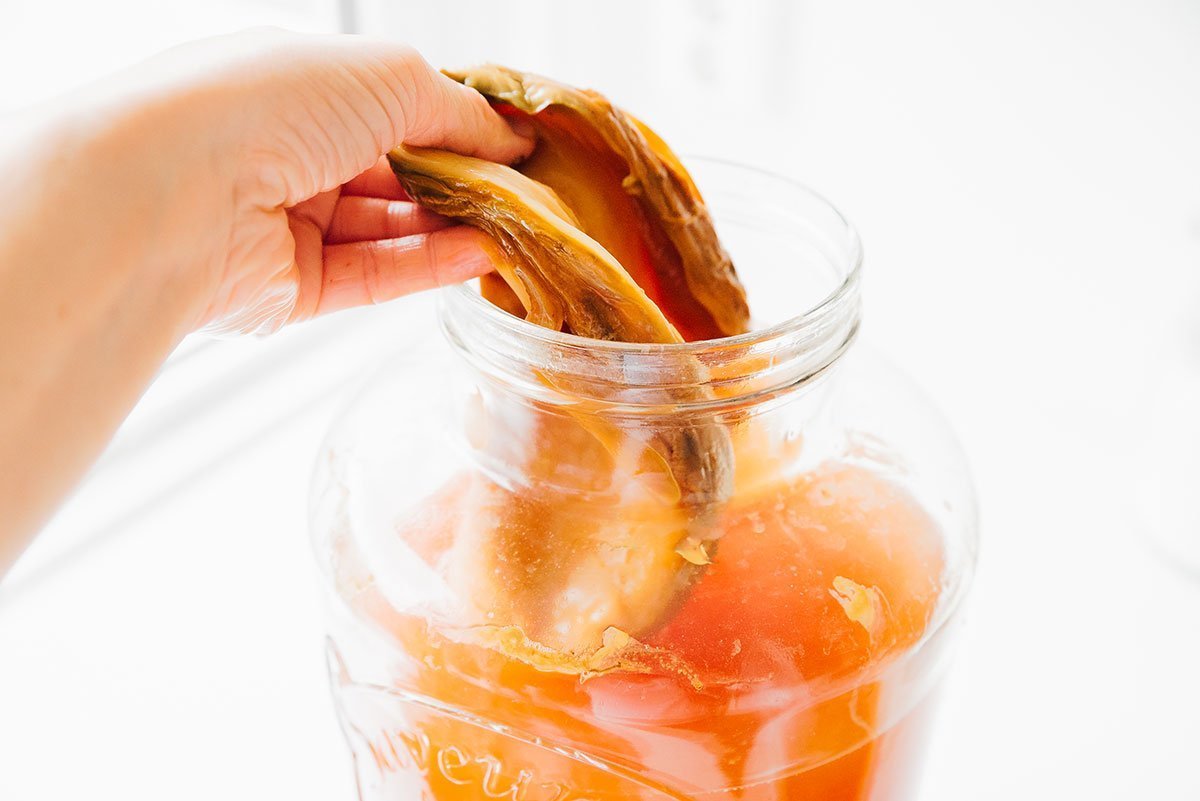
How to fix vinegary kombucha
Let’s say you’ve already let your kombucha go sour and now you’re left with tart kombucha. What can you do to fix it?
Neutralize the flavor with something sweet. You can mix the kombucha with fruit juice, honey/sugar, or pureed fruit (and drink straight from the first fermentation or move to a second fermentation). Sweetness acts as a counterbalance to sourness.
Water it down with carbonated water, a soft drink, or even plain tap water. This helps make the tartness more palatable without the addition of sugars.
“Mine got too vinegar to use for a second ferment and I can’t bottle it as it is too vinegar. How can I get it back so I can use it to do a second ferment?”
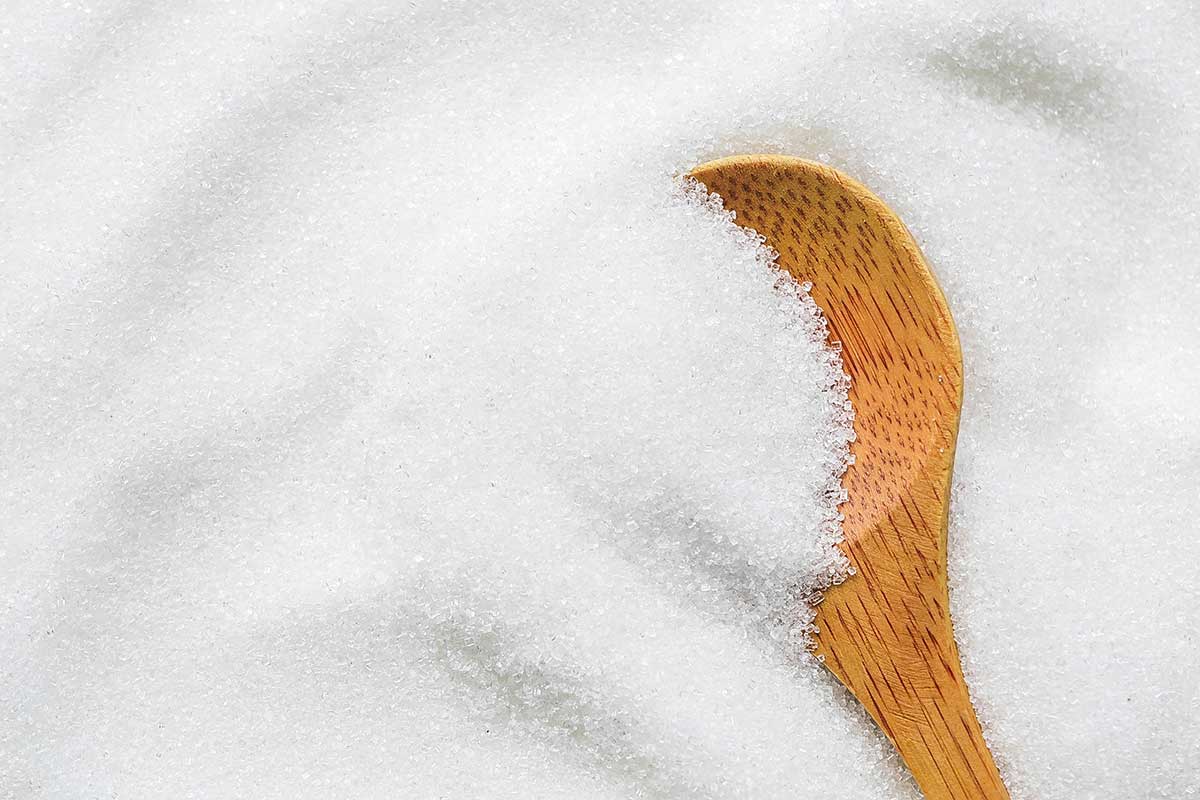
Ways to use sour kombucha
Worst case, your kombucha is way too vinegary to drink. What can you do with over-fermented kombucha?
Use it as a strong starter kombucha for your next batch. I like to keep a bottle of starter in the fridge as a backup (in the event of mold, or if I want to share some starter with a friend).
Make vinegar by letting the kombucha continue fermenting to the point that it tastes like vinegar. Use kombucha vinegar anywhere you would normal vinegar (like in salad dressings, mayonnaise, as a pickling brine, or even as a household cleaner).
Use it as a marinade for proteins or veggies.
Soak grains to make them more digestible.
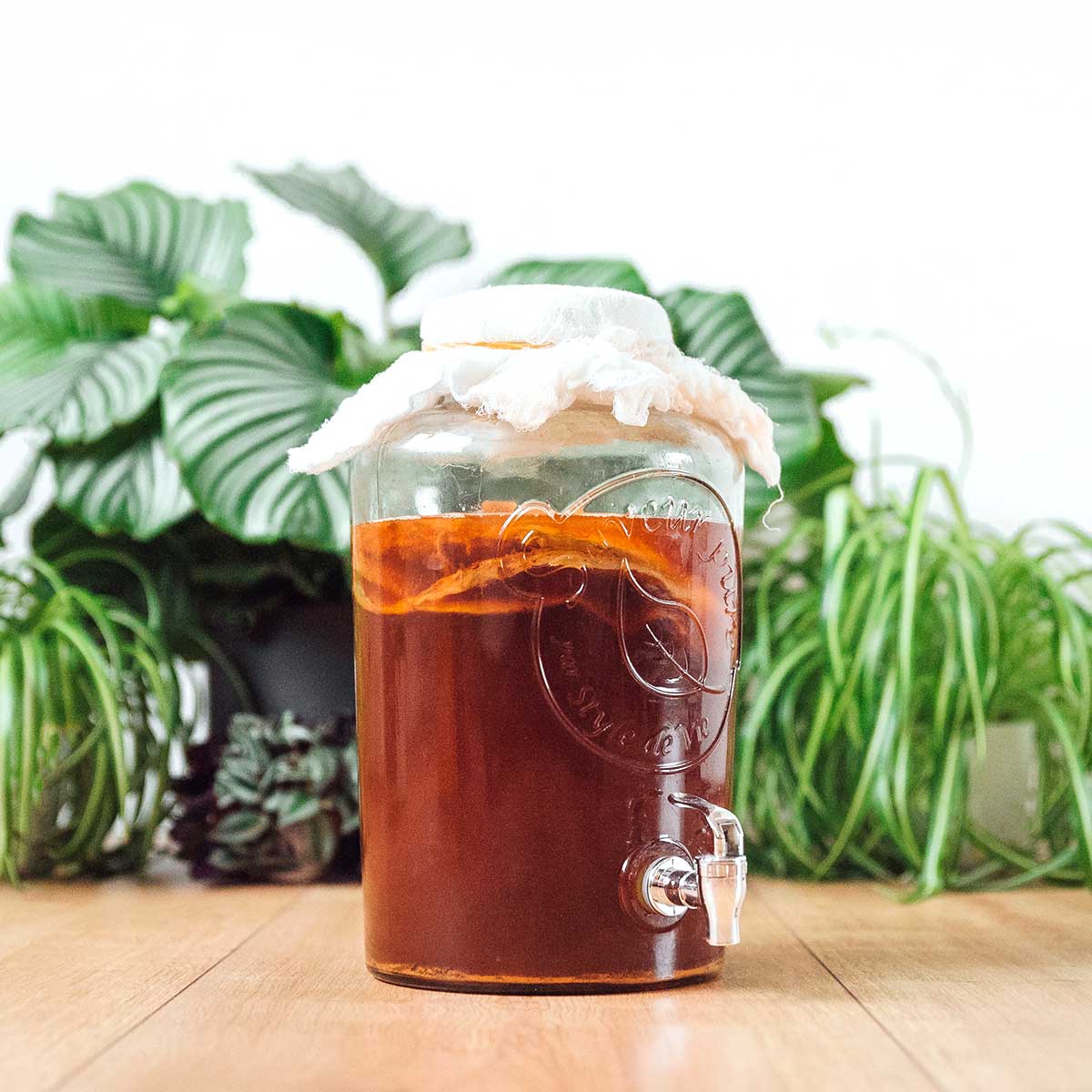

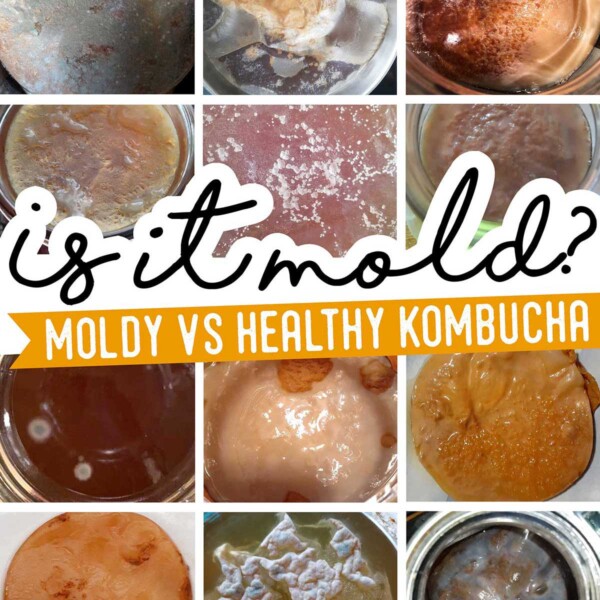
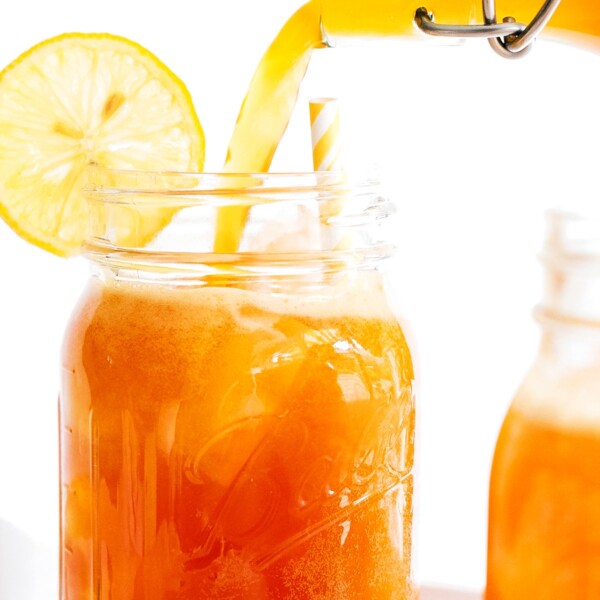
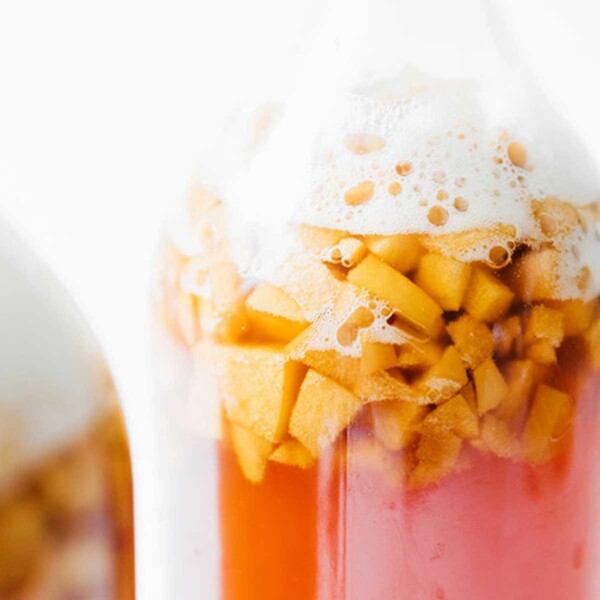
I didn’t think you can keep the kombucha in the refrigerator for over 24 hours because it really slows the activity or active of the Scoby
Thanks for your patience—great point to bring up! You’re totally right that during F1, refrigeration slows or even halts the activity of the SCOBY, which is why we keep it at room temp then. But once you hit F2 (after the SCOBY is removed), it’s totally fine to refrigerate your bottles! In fact, it’s the best way to stop carbonation at the level you like and keep your kombucha fresh. So fridge = bad for F1, but totally useful for F2.
Hi Sarah! My first fermentation turned out fine but when I did my second fermentation it tastes very vinegary. On second ferm I added 100% pomegranit juice and let it fermit for 4 days. It was very carbonated so I put it in the frig. Now it tastes like vinegar! Is there any way to fix it or do I throw it out and start all over? What did I do wrong?? Thank you in advance! Laura McCarty
Hi Laura! It sounds like it may have just over fermented. You can try to salvage it by adding something sweeter (pomegranate is quite tart, go with a sweeter juice). For the next batch, ferment it in F1 for less time 🙂
We recently made marmalade and due to a lemon allergy we had to find an alternative. We used powdered lectin but the tang that lemon gives in the marmalade was missing….on a whim er added my VERY SOUR kombucha and wow! It worked!another way to use sour Kombucha. I live in an incredibly hot country so my kombucha making is a challenge I am yet to overcome.
I’ve been brewing kombucha for almost a year now & have always been able to refrigerate my f2’s in a timely manner…until this last batch. It’s super sour. I have 4 gallons ready to process again but I just can’t bring myself to dump this last one. Is there a way to take some of the sourness out & salvage it?
You could dilute it with sweet tea, or add something sweet to it (like fruit or sugar)!
Thanks for all your valuable information. I’ve read about vinegar kombucha like monmine but I must admit mine ha been sitting in the jar for a couple of months or so. Now it’s completely sour. Any advice please?🤔🤓
Save some of that as starter to make a new batch! 🙂
Hi! I so appreciate your site! I’m having a wonderful time making kombucha. I find that this batch that is in first fermentation is not particularly sweet or vinegary, it has more of a bitter overtone. Is this okay to drink or should I scrap the whole batch (including the SCOBY?!)?
Also I haven’t put my extra SCOBY in a hotel yet so it’s probably fermenting with double what it should be. What is the effect of having too much SCOBY in a first fermentation batch?
Hmm, that bitterness is a bit strange, but if there are no obvious signs of mold (like dry, fuzzy spots), then I think it would be safe to consume. You might try starting a new batch with a new SCOBY, using a different starter tea than you did last time to see if it was an issue of wrong strains of bacteria and yeast getting in there.
And the real benefit of the SCOBY hotel is that you can just save space in your main brewing vessel!
Love your articles, thank you.
I’m a bit confused.
I just started my hotel thinking If I only had one scoby it won’t taste as sour.
Prior to my hotel I made 4 brewings, the 4th one taste sour. My 1st and 2nd bres were delicious.
Is this the proper way with 1 scoby? I joined the FB website reading comments of F1 and F2 but nothing higher. People say they’ve had their scoby for years. Do they dispose of additional scobys in hotels or use in edible smoothies?
It sounds like it may have an overgrowth of yeast! Here’s how to fix vinegary kombucha 😀
I am making kombucha for the first time. The lady I got the SCOBY from said it, and the starter it was in was enough for 5 litres. I could only find a glasjar 3.6 l, so I made strong tea, put in organic raw sugar, let it cool and put in the SCOBY and starter and now after 11 days I think it is too vinegary. Also slightly alcoholic as I thought I had a mild buzz after just tasting it (yes I’m a light weight :)). Anyway, what was the problem? It is supposed to take three weeks so why is it done already?
It totally depends on your environment (heat will speed it up). But 11 days is very normal, I’ve never done 3 weeks.
3 weeks to ferment? My problem is it becomes too vinegary in 7 days. I got my organic scobie on Amazon and now it grew to be quite large. Maybe I need to rinse off all the brown stuff like the article says. I could try letting it sit for only 5 days? I use one cup of sugar and 8 tea bags like this other article instructed.
All of those things would likely help! And reducing the fermentation time 🙂
My kombucha was accidentally left in F1 for 2 weeks… Is it still ok to use as a starter for new kombucha and scoby hotels?
I would give it a taste! If it’s too sour to drink then go ahead and user it as starter. If it tastes good, bottle it up! 😀
Hi Sarah, I just made my first scobies (!) By the time they were done, the resulting liquid tasted sour, vinegary, and musky. I’ve had this musk pop up for me when doing first fermentations before, but have been unable to figure out what it is… any thoughts? I’m fairly certain I didn’t have mold, I’ve looked at as many moldy scoby pics as I can.
(Btw the scobies brewed over 3.5 weeks, at 70-73F, in open air.) thank you!!
It sounds like it could be an unbalance of yeast in your brew! Perhaps try adding a bit of kombucha from another fermentation (or store bought) to help bring the balance back?